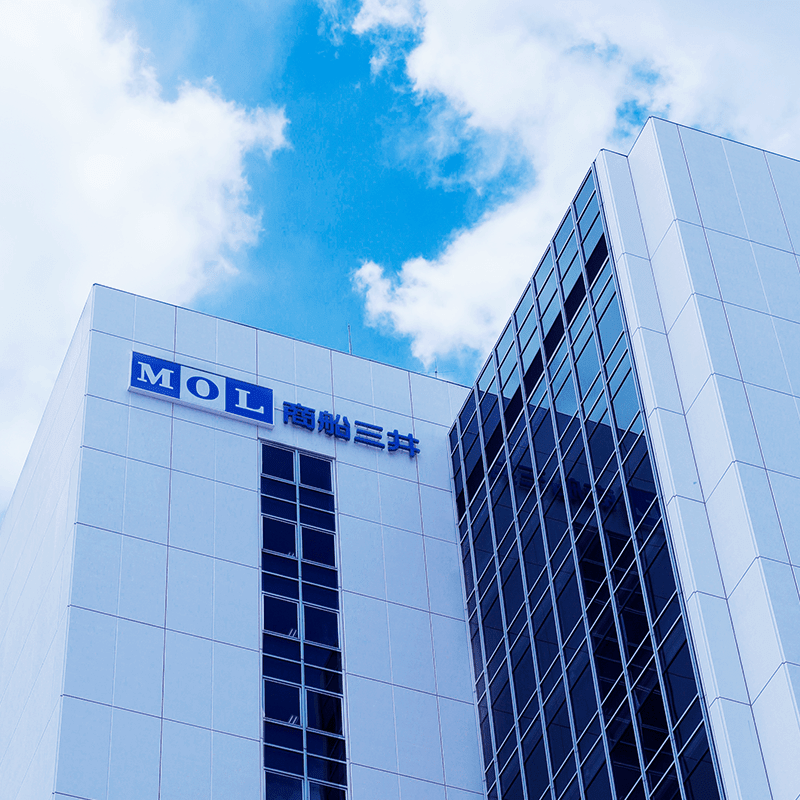BLOG
Now in South Korea - South Korea, Moving Forward Speedily and Positively -
- General Shipping
2023.02.13
Japan and South Korea are neighbors across the sea, with South Korea being Japan's fourth largest trading partner and Japan being South Korea’s third largest. In addition to trade, cultural ties are also strong, with various cultures being assimilated by Japan via the Korean Peninsula over a long period of time. Even recently, Korean culture, especially entertainment such as Korean dramas and K-pop, has attracted many Japanese. On the other hand, there have also been issues that are proving more difficult to resolve, such as the Takeshima/Dokdo and forced labor issues. This has caused both countries to have somewhat complex feelings towards each other. In this article we talked with Toru Fujii, chief country representative and president of MOL (Korea) Co., Ltd., whose remit is the exploring of new business opportunities in a country that is both close and distant.
Looking to Expand into a Wide Range of Areas as a Frontrunner for Business Opportunities
--Please tell us about the origins of MOL Korea and its business.Fujii
- MOL Korea, as a local subsidiary in Republic of Korea, was established in 2016 as a joint venture between MOL and Pan Continental Shipping Co., Ltd., who have been partners in shipping agency services since 1952. Our main businesses were car carriers, with some dry bulk sales and shipping agency services on establishing.
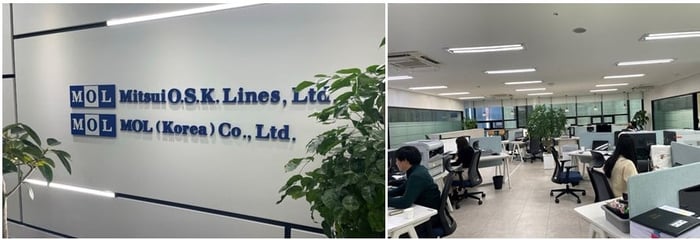
- Due to its closeness to Japan, it used to be common for MOL Tokyo staff to visit customers and shipyards in Korea on a weekly basis, almost as if it were a domestic business trip, but recently it may be difficult or unnecessary to travel back and forth frequently due to both a lack of manpower and the spread of videoconferencing in the wake of the spread of the COVID-19 infection. Under these circumstances, we are trying to deal with a wide range of business interests, both MOL Tokyo business and business that has resulted from MOL Korea’s own initiatives. MOL chief country representatives are at the forefront of local sales, so it is important to find new business opportunities and unearth potential deals, in addition to those that are already in progress. We would like to be involved in a cross range of industries in Korea, not be confined to specific fields but to delve into areas such as transport, bulk transport, product logistics transport, marine technology, and the cruise ship business.
Seize the Opportunity with the shift to Renewable Energy
-- Korea has a large share of thermal power generation and relies on imports for much of its energy needs, but recently it seems that renewable energy which does not rely on fossil fuels is becoming more widespread.
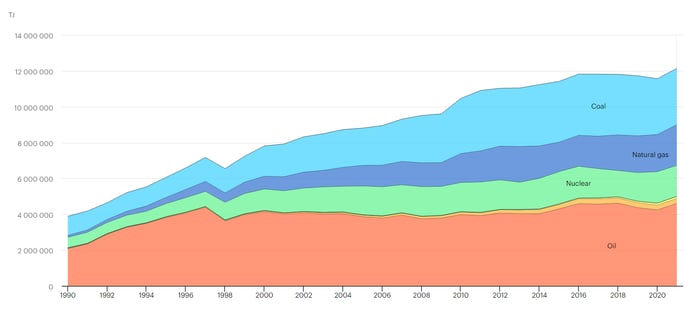
Total Energy Supply by source, KOREA 1990-2021
Source:IEA
- Yes. Thermal power generation accounts for most of the power supply and related businesses are handled by public companies such as Korea Gas Corporation (KOGAS) and Korea Electric Power Corporation (KEPCO). Certain restrictions on energy transportation by these public companies make it difficult for Japanese companies to enter the market. However, when it comes to introducing alternative and renewable energies, there exists business opportunities because it seems it is difficult to complete all these projects using only Korean companies.
- We are particularly interested in offshore wind power. In 2019, South Korea announced its "Green New Deal" plan, which foresees renewable energy accounting for 20% of its power by 2030, including 12 GW of offshore wind power facilities. Many global companies are participating in the offshore wind power business, and these projects are located in regions such as Jeollanam-do, Jeollabuk-do, Incheon, and Ulsan. In addition to our knowledge of Crew Transfer Vessels (CTV), that is those vessels which specialize in transporting workers to those offshore wind farms, MOL completed the first offshore wind maintenance Service Operation Vessel (SOV) in Asia in March 2022 which had significant advantages. We would like to use these advantages to enter the offshore wind power business.
- Another business field we would like to become involved in is the logistics business. MOL already has group logistics companies like MOL Logistics and Utoc, but there is no such organization here in Korea. In order to launch our first logistics business in Korea we would like to promote collaboration with local companies. Specifically, we are attempting to invest in a project involving local companies and to strengthen our overseas network. This project is also expected to support the cold chain project and contribute to the accumulation of our know-how in this area.
- In addition, by taking advantage of the closeness between Japan and Korea, we would like to explore our participation in the "B to C business."
South Koreans, moving forward and drive the economy without fear of failure
-- President Yoon Suk-yeol took office in May 2022, leading the first conservative government in 5 years since 2017. What do you feel has changed regarding relations between Japan and South Korea?Fujii
- Certainly, under the Moon Jae-in administration there was a degree of government propaganda present, and some of our business partners were hesitant or found it uncomfortable to develop their connections with Japanese companies. Although this has changed to a more pro-Japanese mood since the Yoon Suk-yeol administration took office, it is worrisome that his approval rating is low at around 30% (at the time of the interview), partially due to the most unfortunate Itaewon incident.
- However, I have the impression that the general public in Korea is not as aware of current Japan- Korea relations as the Japanese think. Therefore, when Japan excluded Korea from Group A (formerly White Countries) in 2019, a
- group given preferential status in export controls for security purposes, there was a huge surprise and backlash in Korea leading to a boycott of Japanese products. However, there was little impact on business.
Fujii
- One thing that defines Koreans is that they are quick to act and make decisions. We often hear the word "Pali-pali!" in Korea, which means "Quick, quick!." They tend to be rather impatient and spring immediately into action, which sometimes leads to failure. However, this does not overly concern them and they quickly move on to new challenges. The attitude of Korean companies in expanding their scale rapidly can give the impression they are fearless. Conversely, the Japanese tend to think and examine steps to take before making a move. I have, however, learnt to respect and appreciate the Korean temperament and character as we build our working relationship with them. This attitude is exemplified by Samsung when they learned from Panasonic and grew rapidly, being able to tackle new projects without fear can result in huge strength and success.
- As an aside, Korea is said to have the highest household debt ratio as a percentage of GDP among the 37 major OECD countries. They tend not to wait and save for the things they want, but rather borrow more and more money to buy cars, houses and stocks. This indicates to me a strong desire by Koreans to enjoy their life now!
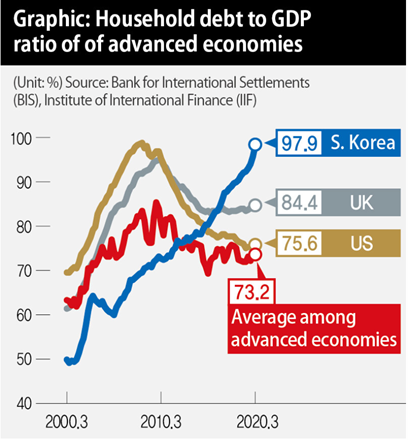
- Source:HANKYOREH
- Another feature is a strong network of personal connections that exists. The relationship between senior and junior relationship in college is especially strong. We let our national staff and consultants work based on their personal
connections, and we rely on these connections to get to know each other and build relationships and trust. On the other hand, they are quite cold to strangers and it is rare to see them pressing the "open" button on a lift and waiting for someone to get in, or holding the door of a shop open and waiting for the next person to come in.(but it might be that Japanese style is strange from the point of global view. )
On the other hand, there is a strong Confucian culture of respect for weaker people, such as the elderly and pregnant women. So, I feel that there is a prevalent tendency, for example, of giving up seats to these people, more so than can be found in Japan.
--What do you enjoy about living in Korea?
Fujii
- My children are still young, so I don't have time for any particular hobbies other than playing golf, but I enjoy eating out at various shops on holiday mornings when my family has not yet woken up. I enjoy Korean food such as Sundubu and Samgyetang, which are familiar to the Japanese, as well as Seonji Haejangguk Soup, cheonggukjang, Gomtang and Chueo-tang Kalguksu, and many other Korean foods. South Koreans laugh at me and say that, "They are all hangover cures." The city is dotted with old markets (called Shijang), so it's interesting to take a peek and buy ingredients there. People who have known me for a long time may think I'm lying, but when I don't have a dinner meeting I usually make dinner at home, and I am also in charge of making the children's school lunches (except when I am suffering from a hangover).
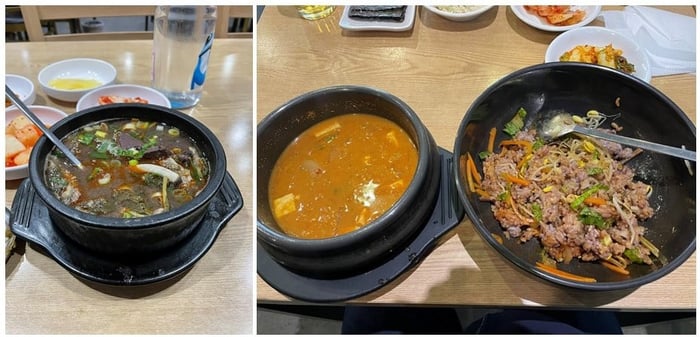
Left: Seonji Soup, Right: Chueo-tang Kalguksu.
Becoming Future Business Partners and Building on each other’s Strengths
--What are your future prospects?
Fujii
- From a global perspective, the distance between Japan and Korea is close and the market potential for transportation between the two countries is still high. You might think that Japan and Korea would be competitors because both economies are based on processing trade, but there are some surprising differences.
- As an easy-to-understand example, Japan seems to be on the decline in the semiconductor business, but it still has a strong presence in the manufacturing of raw materials for semiconductors such as silicon wafers and in the manufacturing equipment field.
- In addition, the shipbuilding and steel industries here, for which the Korean government provides very generous support, have world-class facilities. On the other hand, we often hear that many Japanese products are used for marine equipment and maintenance components for blast furnaces in steel mills.
- Under these circumstances, I expect that more business opportunities could be created if Japan and Korea could take advantage of each other's strengths and position themselves in the world as "a single economic block in East Asia," rather than just seeing each other as partners for collaboration.
- With the RCEP agreement just entering into force last year, the road to genuine free trade between Japan and Korea is likely to take some time, but we see signs of improvement in relations between the two countries and I wonder every day if this could be a turning point and whether there is something MOL, as a shipping company, can become more involved in.
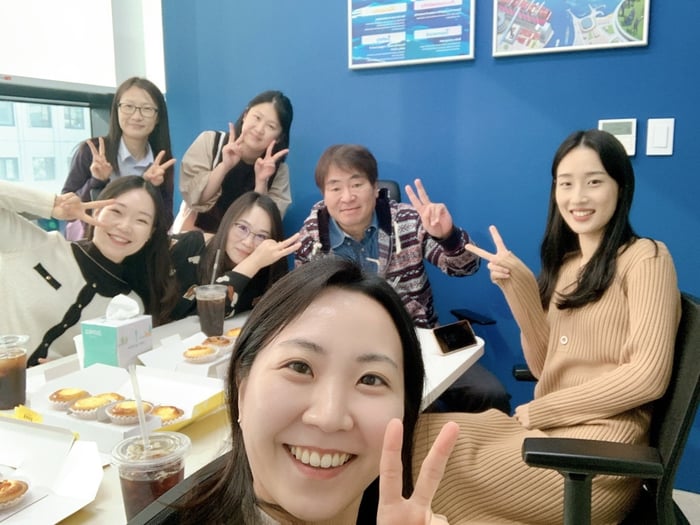
- Toru Fujii
Managing Director, MOL (Korea) Co., Ltd.
Chief Country Representative of Korea, Mitsui O.S.K. Lines, Ltd.
He has been in his current position since 2019. He feels a connection to South Korea, as much of his career was spent in the car carrier division and he had frequent business trips to South Korea.
Recommended Articles
2022.07.05
- General Shipping
2021.04.13
- Energy
2025.03.18
- General Shipping
2021.08.07
- Eco Friendly
Latest Articles
2026.01.20
- Eco Friendly
- General Shipping
2025.12.09
- Eco Friendly
- General Shipping
2025.12.03
- General Shipping



